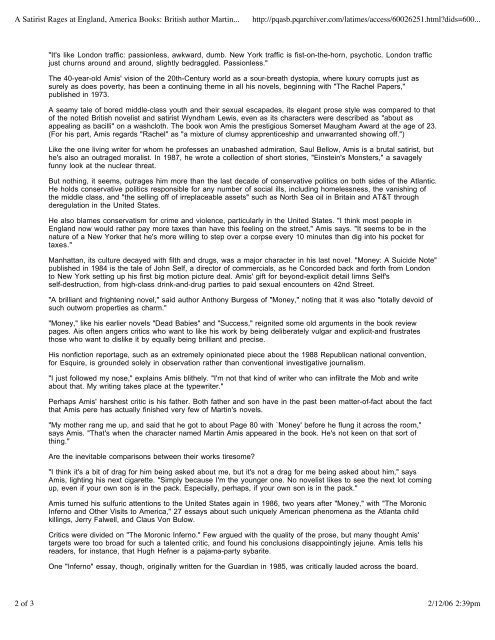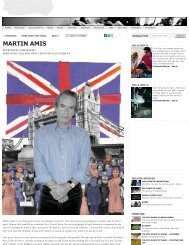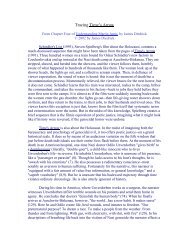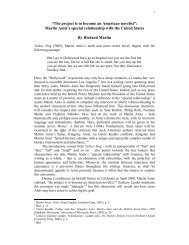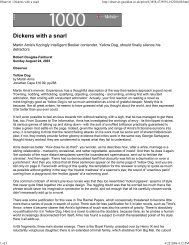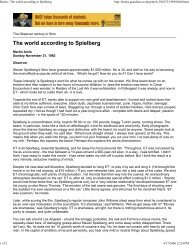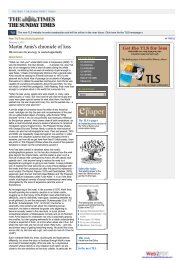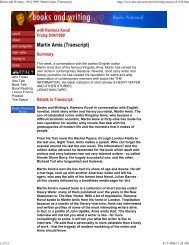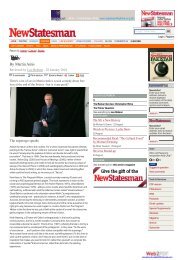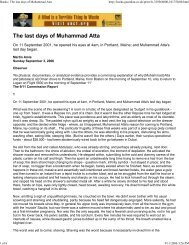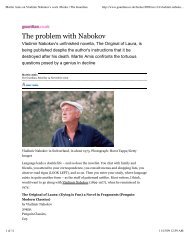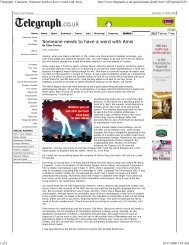Los Angeles Times - Martin Amis
Los Angeles Times - Martin Amis
Los Angeles Times - Martin Amis
Create successful ePaper yourself
Turn your PDF publications into a flip-book with our unique Google optimized e-Paper software.
A Satirist Rages at England, America Books: British author <strong>Martin</strong>...http://pqasb.pqarchiver.com/latimes/access/60026251.html?dids=600..."It's like London traffic: passionless, awkward, dumb. New York traffic is fist-on-the-horn, psychotic. London trafficjust churns around and around, slightly bedraggled. Passionless."The 40-year-old <strong>Amis</strong>' vision of the 20th-Century world as a sour-breath dystopia, where luxury corrupts just assurely as does poverty, has been a continuing theme in all his novels, beginning with "The Rachel Papers,"published in 1973.A seamy tale of bored middle-class youth and their sexual escapades, its elegant prose style was compared to thatof the noted British novelist and satirist Wyndham Lewis, even as its characters were described as "about asappealing as bacilli" on a washcloth. The book won <strong>Amis</strong> the prestigious Somerset Maugham Award at the age of 23.(For his part, <strong>Amis</strong> regards "Rachel" as "a mixture of clumsy apprenticeship and unwarranted showing off.")Like the one living writer for whom he professes an unabashed admiration, Saul Bellow, <strong>Amis</strong> is a brutal satirist, buthe's also an outraged moralist. In 1987, he wrote a collection of short stories, "Einstein's Monsters," a savagelyfunny look at the nuclear threat.But nothing, it seems, outrages him more than the last decade of conservative politics on both sides of the Atlantic.He holds conservative politics responsible for any number of social ills, including homelessness, the vanishing ofthe middle class, and "the selling off of irreplaceable assets" such as North Sea oil in Britain and AT&T throughderegulation in the United States.He also blames conservatism for crime and violence, particularly in the United States. "I think most people inEngland now would rather pay more taxes than have this feeling on the street," <strong>Amis</strong> says. "It seems to be in thenature of a New Yorker that he's more willing to step over a corpse every 10 minutes than dig into his pocket fortaxes."Manhattan, its culture decayed with filth and drugs, was a major character in his last novel. "Money: A Suicide Note"published in 1984 is the tale of John Self, a director of commercials, as he Concorded back and forth from Londonto New York setting up his first big motion picture deal. <strong>Amis</strong>' gift for beyond-explicit detail limns Self'sself-destruction, from high-class drink-and-drug parties to paid sexual encounters on 42nd Street."A brilliant and frightening novel," said author Anthony Burgess of "Money," noting that it was also "totally devoid ofsuch outworn properties as charm.""Money," like his earlier novels "Dead Babies" and "Success," reignited some old arguments in the book reviewpages. Ais often angers critics who want to like his work by being deliberately vulgar and explicit-and frustratesthose who want to dislike it by equally being brilliant and precise.His nonfiction reportage, such as an extremely opinionated piece about the 1988 Republican national convention,for Esquire, is grounded solely in observation rather than conventional investigative journalism."I just followed my nose," explains <strong>Amis</strong> blithely. "I'm not that kind of writer who can infiltrate the Mob and writeabout that. My writing takes place at the typewriter."Perhaps <strong>Amis</strong>' harshest critic is his father. Both father and son have in the past been matter-of-fact about the factthat <strong>Amis</strong> pere has actually finished very few of <strong>Martin</strong>'s novels."My mother rang me up, and said that he got to about Page 80 with `Money' before he flung it across the room,"says <strong>Amis</strong>. "That's when the character named <strong>Martin</strong> <strong>Amis</strong> appeared in the book. He's not keen on that sort ofthing."Are the inevitable comparisons between their works tiresome?"I think it's a bit of drag for him being asked about me, but it's not a drag for me being asked about him," says<strong>Amis</strong>, lighting his next cigarette. "Simply because I'm the younger one. No novelist likes to see the next lot comingup, even if your own son is in the pack. Especially, perhaps, if your own son is in the pack."<strong>Amis</strong> turned his sulfuric attentions to the United States again in 1986, two years after "Money," with "The MoronicInferno and Other Visits to America," 27 essays about such uniquely American phenomena as the Atlanta childkillings, Jerry Falwell, and Claus Von Bulow.Critics were divided on "The Moronic Inferno." Few argued with the quality of the prose, but many thought <strong>Amis</strong>'targets were too broad for such a talented critic, and found his conclusions disappointingly jejune. <strong>Amis</strong> tells hisreaders, for instance, that Hugh Hefner is a pajama-party sybarite.One "Inferno" essay, though, originally written for the Guardian in 1985, was critically lauded across the board.2 of 3 2/12/06 2:39pm


